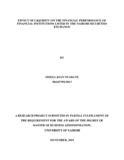| dc.description.abstract | Financial institutions are faced with the problem of how to select and identify the optimum point
or the level at which they can maintain its liquid assets in order to optimize its return. This
problem becomes more pronounced as good numbers of institutions especially financial
companies are engrossed with profit and performance maximization and as such they tend to
neglect the importance of liquidity management. Towards this end, the research sought to
establish the effect of liquidity on the financial performance of financial institutions listed in the
Nairobi Securities Exchange. The study adopted descriptive research design where secondary
data was retrieved from the balance sheets, income statements and notes of 19 financial
institutions in the NSE for period covering 2010-2014. A regression model was developed to
determine the relationship between the dependent variable (Financial performance) and
independent variables included liquidity while capital structure was used as the control variable.
Pearson’s correlation and regression analysis were used for the analysis. The results indicated
that the relationship between liquidity and financial performance is weak with an adjusted R2 of
55.17% and also that capital structure had a significant relationship with ROA while liquidity
had an insignificant relationship. The results further show that there is a negative relationship
between NSE listed financial institutions’ cash position indicator with ROA. This might be
explained with the view that with inadequate cash position, then the firm will borrow at possible
high interest rate costs and thus reduce the firm’s financial performance. The study concluded
that liquidity management is not a contributor alone of the firm’s financial performance and there
exist other variable that will influence ROA. However, it is important for a firm to understand
the effect of liquidity components on the firm’s financial performance and also undertake
deliberate measures to optimize its liquidity level. The study also recommends a further study on
the role of liquidity on a firm’s financial performance by incorporating more liquidity variables
and control variables. | en_US |

